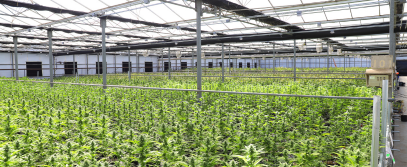As Profitability Challenges Persist in the Cannabis Market More Real Estate and M&E Buying Opportunities Emerge

This article discusses developments in the Cannabis industry, including how fierce competition and lower than anticipated levels of profitability in some markets are creating unexpected market entry and asset acquisition opportunities for 2023.
Steve Katz
Hi, everybody, and thanks for taking time out of your busy schedule to listen in on our Hilco global smarter perspective podcasts as return listeners know by now I’m your host, Steve Katz. And if this is your first time with us, welcome, we’re glad you could tune in. Today we’ll be talking about what’s proven to be a really complex cannabis market landscape and what some of the biggest challenges are likely to be in the coming year as a result of a few factors including regulatory and economic issues. And with us for that conversation is returned podcast guest John Sater, who’s senior managing director for the Midwest region of Hilco real estate appraisal. John, welcome back to the podcast. It’s been a while and things have really evolved as the markets matured, and although clearly, it’s still in its infancy in terms of what expectations now right now, particularly as we get closer to seeing legislation introduced at the federal level.
John Satter
Great to be on Steve, and yes, lots to talk about as the cannabis market evolves.
Steve Katz
All right. Well, let’s just jump into it, then. I’m thinking maybe you can start us out with a little bit of the lay of the land, market size, expected growth, states coming online, and current penetration numbers across the country?
John Satter
Absolutely, Steve. Yes, the industry is facing lots of challenges related to the fact that it’s still illegal to cultivate and sell cannabis under federal law. There are fragmented and varying state and municipal laws that have led to different rules from state to state or town to town and supply side imbalances. Also, the cost of entry has been high because traditional capital sources are not accessible. For these and a lot of other reasons, you’re likely to hear cannabis investment environment described using terms like uncertain, volatile, promising all in one breath. The good news is that the revenue generated by the industry is significant and more states have recently approved adult use. Despite stagnation at the federal level, total revenue from the cannabis industry for 22 is presently projected to end up about $32 billion. We also expect revenue to essentially double over the next five years. Some key states, New York, New Jersey, Maryland and Missouri are among the newest states introducing legalized recreational cannabis sales, which will help fuel overall growth. There are currently 21 states plus Washington DC and Guam that have legalized recreational or adult use marijuana laws. Well, medical cannabis is legal in 40 states plus DC and Guam. Also there are 31 states that have decriminalized low level cannabis possession. Those stats were will continue to increase and within a couple of years, it’s very likely that half of the states in the US will have some form of recreational cannabis laws.
Steve Katz
John, before the podcast we were chatting about the fact that in a lot of states where legalization is expected, many of the assets like land and warehouse space for cultivation are already in place or are at least being put in place. So can you talk about how that is likely to help speed momentum in markets as legalization occurs across the country?
John Satter
Well, that’s a good point. We’re seeing data that shows as the industry evolves from the time when medical uses legalized to when the first recreation sale happens is shrinking dramatically. There’s been a significant investment in infrastructure with many of those who have invested in the CBD or medicinal cannabis businesses hemp or cannabis cultivation facilities, processing facilities and dispensaries waiting for the medical or adult use payoff when recreational use legalization occurs. It allows for accelerated implementation for adult use and a quicker path to profitability. We expect the ongoing lobbying that is taking place at the federal level to create a regulatory framework that will either eliminate or at least alleviate some of the biggest roadblocks for cannabis, cultivators, processors, and sellers. This will be a game changer. But the longer it takes, the harder harder it becomes for some companies to hang on.
Steve Katz
Interesting. All right. I wonder if we could talk for a minute about because I know this is a big deal. Now the impact of MSOs and you can explain what I’m us MSOs are for the listeners who don’t know.
John Satter
So the impact of MSOs on the trajectory of growth in the industry right now. Sure, for those who do not know, MSOs are multi state operators that are vertically integrated. Well establish technologically sophistic heated and in most instances have access to more capital than local startups. As a result of the regulatory variation, states that welcome and issued licenses to companies from beyond their borders, which not all do have attractive multi state operators. So in the MSOs, have gotten a foothold in multiple states, and are growing into regional and national powerhouses with early brand recognition. Many MSOs have operated in the Canadian market, and have experienced establishing a brand and vert vertically integrated operations quickly, despite being limited by some regulatory roadblocks. For instance, businesses are licensed and operated at the state level. And there are restrictions on products crossing state lines. However, MSOs have invested in and positioned themselves well for growing in emerging emerging markets. So we view their presence in multiple states is having a significant impact on the growth and character of the cannabis industry going forward.
Steve Katz
Yeah, so it’s, you know, it’s like a lot of industries, it seems I mean, it’s a it’s a good thing and a bad thing. Good in terms of, like you said, it can help speed that growth but kind of limits some of the potential for the smaller operators who are either being gobbled up or kind of edged out, I would imagine, what else would you want to call out about what’s happening in the market right now?
John Satter
Regulatory differences from state to state, there are economic influences like inflation and economic downturn to contend with in the near term. Interestingly, the more mature markets like Washington State, Colorado and Florida, are in a better position to survive the current inflation crisis and an economic downturn than the markets and states with recently passed legalization and more fragmented infrastructure. The startup businesses are likely to be less resilient, and will have a harder time surviving economic upheaval, requiring greater cash burn in the near term as a supply and demand metrics evolve. Legacy states add mature or mature markets with stabilized supply and demand fairly imbalance and face less new competition and have a greater guaranteed share of the market despite economic headwinds, but the more established markets have their own challenges as well. The supercharge sales we saw taking place during a pandemic are just not sustainable. And the current economic climate has most analysts anticipating an overall cannabis price decline and supply constraints ease and those MSOs that we talked about exert their dominance across new markets. Clearly founder and vice chairman Joe Sardi, recently stated at the sixth annual State of the cannabis industry conference, that the company vision is to be the Starbucks of the cannabis industry, operating worldwide, providing a consistent high quality product, and the company is committed to the long term to be a leader providing cannabis products. We also note that in several states, regulations and dispensary shelf space limitations are forming alliances between the MSOs that will stock each other’s brands. muscling out the small operators. There are bright spots for wholesale pricing in mid mature markets like Illinois, Massachusetts, where cultivators haven’t had the time to grow more supply than is demanded. And these states also have limited licensing, unlike Michigan, that has no cap on cultivation and processing licenses, which has led to a major wholesale cannabis price collapse this year.
John Satter
And also going back to themselves. As more and more states come online for adult recreational use. More consumers will get into the market with preferences for certain brands and brand consistency, leading to further expansion of the MSOs market share. That’s a trend we’re seeing now is likely to build as those brands build national recognition. As a result, even with the declines in revenue that they’re experiencing, MSOs will have an edge in raising capital as well, which means they’ll continue to innovate, introduce new technologies, gain efficiencies, and likely dominate the market. And as the MSOs evolve, and as regulatory conditions do as well, the flow of capital into the industry will likely diversify and expand. Some states have already legalized cannabis have removed some barriers, but it will take action at the federal level to make significant capital flow more readily into the industry.
Steve Katz
It’s interesting to note some of those differences between the markets and and then I didn’t even realize how significant the penetration of the MSOs is. So that’s also I’m sure news to a lot of people were listening in. I know this is kind of your sweet spot. What about the real estate? You know, I mean a lot of exuberance and buying real estate by licensees big prices paid has it been well justified where’s the money coming from and for those who might be interested is there’s still a chance for investors who want to get in.
John Satter
Arguably the most valuable assets on the balance sheets of many cannabis companies is their real estate and equipment. across any evolving industry, companies in possession of desirable real estate assets have been able to gain access to cheaper capital. And in the cannabis industry, immense amount of private capital had been spent on the acquisition of real estate associated with cultivating, processing and distributing cannabis over the past decade as part of the pre licensing process, and to a large extent as a means of preventing restrictions being placed on those businesses by landlords, well funded licensed applicants across states that have legalized cannabis, and those who were able to raise a lot of money quickly once those licenses were granted. Purchase big ticket parcels and prime urban locations, and many paid big premiums over non cannabis value for the privilege anticipating a business windfall down the line. Also, cannabis business businesses operate and hold sizable amounts of cash and are challenged by an inability to bank funds to federal banking laws. Plus business operations are classified as illegal by the IRS. And companies are exposed to tax laws that require payments of up upwards to 60% of profits for illegal business enterprises. So companies try to channel the cash back into the business, more real estate in highly desirable locations at premium prices, as well as specialized equipment needed for state of the art growing and processing athletic facilities and create premium customer experiences at dispensary sites. But now with the fierce competition taking place in states such as California, Michigan and Colorado, product margins have been driven down, profitability has been reduced, and real estate and machinery equipment associated with the industry is coming up for auction or sale. But this isn’t necessarily non successful operators looking to close locations. Rather, we see market leaders offering sale leaseback deals to raise capital to fund business operations and in the process partnering with investors that will not restrict the cannabis activities or future growth potential at the sites. And this is a really interesting point. Because while the companies that choose to sell the real estate will get access, they need to fund short term strategic acquisitions, build outs or to feed their supply chain, they may ultimately impact their own ability to raise capital by decreasing the overall value of the assets they hold. So the bottom line is and investors are in a position to be selective right now. And the scarcity of available capital favors cannabis companies with strong balance sheets that can withstand the current headwinds. While this disadvantages new market entrants, we’re seeing states addressing this disparity through some social equity programs, targeted targeted to help smaller local companies to get up and running and compete with MSOs and other well funded operators. Even so the smart players are not likely to own or be in a position to purchase the real estate they need for cultivation, processing are selling. So this in turn creates opportunities for 1031 investors. And there seems to be more and more of those out there chasing yield in the cannabis market. And as we know, real estate is often the entry point for many investors. And as the industry continues to gain acceptance, more traditional REITs and 1031 real estate investors will be taking a look at this market, given the fact that they can get a higher return on investment. And in cases where those in the industry may be looking to close one or more locations in a single or multiple geography, particularly those wells located in well, traffic, urban and metro areas. The buying opportunity for good real estate, least by a strong operator can hold significant potential.
Steve Katz
Very, very good. So it sounds like still a lot of opportunity. A lot of sort of incentivized programs, you know, depending on where you’re talking about in the country. John, listen, we’re we’re really out of time. Really appreciate you being on again, hope you will come back and see us sometime soon. What is the best way for people to get a hold of you if they want to have a little bit of a more complete conversation about their situation or what they might be interested in? Learning or getting involved in industry?
John Satter
Sure, Steven. Glad to be on able to share our thinking and vision for the cannabis industry. But I can be reached by email, Jsatter@hilcoglobal.com. J s a t t e r at HILCOGLOBAL.com. Direct phone number at Hilco 475. 504.2472
Steve Katz
All right, thanks again John and listeners if your business or business in your portfolio is looking to sell or acquire real estate associated with the cannabis industry, or sell or require specialized equipment utilized within the industry, or even invest in those businesses touching base with John is probably a great first step. As I said, he has a lot of experience in the area, as does his team. And whilst focuses on real estate itself, he can connect you with others across the whole cold platform, who specialize in areas including industrial asset monetization, disposition, and other specialty areas so good people to talk to knowledgeable and easy to get a hold of. So as always, we hope that this smarter perspective podcast provided you with at least one key takeaway that you can put to good use in your business or share with a colleague or client to help make them that much more successful moving forward. And one last thing please remember that you can check out more great podcasts and articles featuring timely insights from Hilco experts like John at Hilcoglobal.com forward slash smarter dash perspectives. Till next time for Hilco global. I’m Steve Katz.




